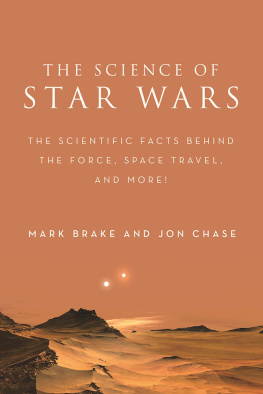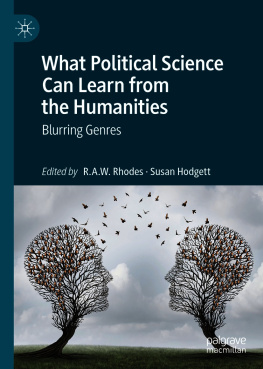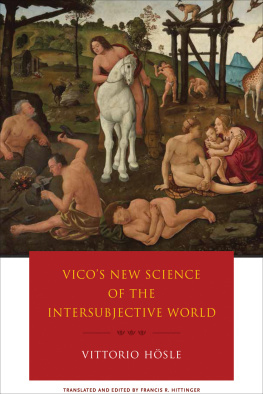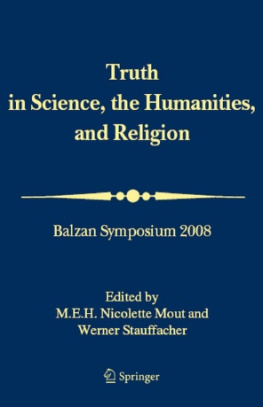OVERCOMING THE TWO CULTURES
Fernand Braudel Center Series
Edited by Immanuel Wallerstein
Alternatives: The United States Confronts the World
by Immanuel Wallerstein
The Modern World-System in the Longue Dure
edited by Immanuel Wallerstein
Overcoming the Two Cultures: Science versus the Humanities in the Modern World-System
Richard E. Lee and Immanuel Wallerstein, coordinators
OVERCOMING THE TWO CULTURES
SCIENCE VERSUS THE HUMANITIES IN THE
MODERN WORLD-SYSTEM
RICHARD E. LEE AND IMMANUEL WALLERSTEIN,
COORDINATORS
WITH
VOLKAN AYTAR
AYE BETL ELIK
MAURO DI MEGLIO
MARK FREZZO
HO-FUNG HUNG
BIRAY KOLLUOLU KIRLI
AGUSTN LAO-MONTES
ERIC MIELANTS
BORIS STREMLIN
SUNARYO
NORIHISA YAMASHITA
DENIZ YKSEKER
First published 2004 by Paradigm Publishers
Published 2016 by Routledge
2 Park Square, Milton Park, Abingdon, Oxon OX14 4RN
711 Third Avenue, New York, NY 10017, USA
Routledge is an imprint of the Taylor & Francis Group, an informa business
Copyright 2004, Taylor & Francis.
All rights reserved. No part of this book may be reprinted or reproduced or utilised in any form or by any electronic, mechanical, or other means, now known or hereafter invented, including photocopying and recording, or in any information storage or retrieval system, without permission in writing from the publishers.
Notice:
Product or corporate names may be trademarks or registered trademarks, and are used only for identification and explanation without intent to infringe.
Library of Congress Cataloging-in-Publication Data
Overcoming the two cultures: science versus the humanities in the modern world-system / Richard E. Lee and Immanuel Wallerstein, coordinators; with Volkan Aytar [et al.].
p. cm (Fernand Braudel Center series)
Includes bibliographical references and index.
ISBN 1-59451-068-7 (hardcover: alk. paper) ISBN 1-59451-069-5 (pbk.: alk. paper)
1. Interdisciplinary approach to knowledge. 2. Culture. 3. Science and the humanities. I. Lee, Richard E., 1945- II. Wallerstein, Immanuel Maurice, 1930-III. Aytar, Volkan. IV. Series.
HM651.O94 2004
001dc22
2004016382
Designed and Typeset by Straight Creek Bookmakers.
ISBN 13: 978-1-59451-068-7 (hbk)
ISBN 13: 978-1-59451-069-4 (pbk)
Contents
1
Introduction: The Two Cultures
Richard E. Lee and Immanuel Wallerstein
Part I
Historical Construction of the Two Cultures
2
Constructing Authority: The Rise of Science in the Modern World
Boris Stremlin
3
Reaction and Resistance: The Natural Sciences and the Humanities, 17891945
Eric Mielants
4
The Social Sciences and Alternative Disciplinary Models
Mauro Di Meglio
5
The Ambivalent Role of Psychology and Psychoanalysis
Mark Frezzo
6
Orientalism and Area Studies: The Case of Sinology
Ho-fung Hung
Part II
Contemporary Challenges in and to the Structures of Knowledge
7
Complexity Studies
Richard E. Lee
8
Science Studies
Norihisa Yamashita
9
The Cultural Turn in the Social Sciences and Humanities
Biray Kolluolu Krl and Deniz Ykseker
10
Gender: Feminism and Womens Studies
Volkan Aytar and Aye Betl elik
11
Regional Categories of Analysis: Latin/o Americanisms
Agustn Lao-Montes
12
Environment and Ecology: Concepts and Movements
Sunaryo
13
The Culture Wars and the Science Wars
Richard E. Lee
14
Conclusion?
Immanuel Wallerstein
Richard E. Lee and Immanuel Wallerstein
The two cultures is a phrase invented by C. P. Snow in 1959,1 but the phenomenon he was describing is of course older. It is not, however, all that old, and that is the point of this book. In terms of human history, the idea that there are two cultures is relatively recent. Furthermore, whereas when Snow wrote his book, the concept seemed self-evident, which is why Snows phrase caught on, its validity has come under increasing challenge since the 1960s. We shall try to explain the origin of the concept, its impact and pervasiveness, and the nature of the challenges to it in recent years. This will, we hope, enable us to assess the likelihood that this way of structuring knowledge will continue to prevail and, if it does not, what the alternatives are.
The word culture in the phrase two cultures refers to the fact that scholars do their research, writing, and teaching on the basis of underlying epistemological presuppositions, which they use but seldom expound. To say that there are two cultures (in the structures of knowledge) is to say that scholars tend to group themselves in two different, indeed often opposing, camps with regard to the set of epistemological presuppositions they employ and believe useful and/or correct to employ.
The idea that there are two cultures is a comparatively simple one. The problem posed by Snow, by training a scientist: by vocation a writer (1993: 1), was that the two cultures did not understand each other. He was the master of a college at Cambridge, where fellows from many different disciplines met at high table. Snow observed,
Constantly I felt I was moving among two groupscomparable in intelligence, identical in race, not grossly different in social origin, earning about the same incomes, who had almost ceased to communicate at all, who in intellectual, moral and psychological climate had so little in common that instead of going from Burlington House or South Kensington to Chelsea, one might have crossed an ocean. (1993: 2)
Snow felt that such lack of mutual understanding among scholars was dangerous and a social loss, and his lectures were an attempt to bridge the gap by explaining each of the two cultures to the other. Snow was of course certain that there did exist two cultures and that they were quite different one from the other, and that in a sense they ought to be different. For Snow, the fact that there were two cultures represented an intellectual division of labor that was intelligible and justifiable. He was primarily (perhaps only) concerned with minimizing the internecine strife that had resulted from this scholarly reality. We are, by contrast, asking how the gulf between the two cultures was created and whether it can be overcome. Is it being overcome? Should it be overcome?
What does one mean by the two cultures? What even are their names? The answer is not so simple. One of the two cultures is usually called the scientific culture. The other has many names: the literary, the philosophical, the humanistic culture. We shall see that the fact that the latter has many names, while the name of the scientific culture is largely agreed upon, is not completely accidental. For Snow, as for many others, the two cultures are not symmetrical. They exist in a hierarchy of importance and/or merit, although which is higher has been a subject of de-bate.2 And they are of different longevity: the humanistic culture is considered to be the older one, the traditional one, whereas the scientific culture is usually said to be the newer, more modern one.3








